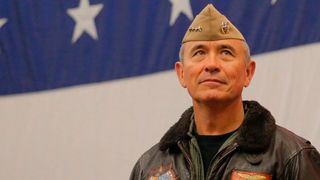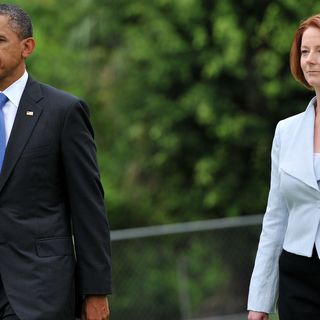Admiral Harry Harris, the top US military commander in the Indo-Pacific, is set to be formally nominated as the US Ambassador to Australia in two weeks, when Prime Minister Malcolm Turnbull meets President Donald Trump in Washington.
The nomination of a four-star military commander to the Canberra posting would be a clear signal of US commitment to the military alliance. Harris will take over from Charge D’Affaires James Carouso, a career foreign service official with a background in economic and commercial issues. The last ambassador, John Berry, had worked as a Democratic staffer in Congress and senior public servant in Washington and his predecessor Jeff Bleich was a distinguished lawyer and adviser to President Obama.
A four-star general has not lived in Australia since Douglas Macarthur during World War II. Since May 2015, Harris has served as commander of PACOM (US Pacific Combatant Command) responsible for more than 370,000 military and civilian personnel conducting US military operations in an area spanning half of the world’s surface. The ambassadorship might seem like a downgrade from commander of PACOM, but Harris will exert influence through a direct line to both the US president and Australian prime minister and a deep web of contacts in the American and Australian national security communities.
Harris has shown considerable awareness of Australian political sensitivities in his current role, having remained carefully neutral on questions of Australian foreign policy, particularly over potential Australian freedom of navigation operations in the South China Sea.
Harris is best known for his tough views on China. He’s been labelled Beijing’s least favourite American, having described China as “provocative and expansionist” and coined the term “Great Wall of Sand” to illustrate its island-building in the South China Sea. China will already have made its displeasure about Harris’ candidacy known in the halls of Australia’s parliament.
As ambassador, Harris will face a range of challenges for which he is well prepared. His first challenge will be to navigate Australia’s febrile China debate. Both Berry and Carouso have not hesitated in making frank public comments about Australia’s relationship with China. As ambassador, every one of Harris’s China-related utterances will attract media scrutiny. Harris has shown considerable awareness of Australian political sensitivities in his current role, having remained carefully neutral on questions of Australian foreign policy, particularly over potential Australian freedom of navigation operations in the South China Sea.
The second challenge for Harris will be to deepen US-Australia strategic co-ordination, including with other regional allies and partners. Harris is also well suited to this assignment, having visited Australia several times and attended AUSMIN meetings between the US secretaries of state and defense and the Australian foreign and defence ministers. In private meetings with Australian political and public service leaders, Harris will invariably push for much closer alignment in the alliance.
Yet there is the risk that Harris’ well-known China stance will backfire. If and when Australia adopts more robust measures against China, the government will have to demonstrate that such moves are the result of Australian deliberations rather than Harris’ influence. Should Labor win government at the next election, Bill Shorten and Penny Wong will be acutely aware of this risk.
Absent a crisis in the alliance, the most difficult assignment for Harris might be a visit to Australia by President Trump. Obama and Bush each visited Australia and addressed Parliament during their first term. The visit of a political leader is always a stressful test of an ambassador’s political and organisational abilities, but President Trump’s unpopularity in Australia would pose an added challenge.
Assuming that Harris avoids the fate of Victor Cha – the Trump administration’s official nominee for ambassador to South Korea whose candidacy was withdrawn last week – his nomination would need to be confirmed by the US Senate. The delay in the nomination and confirmation of the new US ambassador is significant: Bleich was confirmed by the US Senate in November of the first year of Barack Obama’s presidency, Bush’s first nominee Tom Schieffer in the corresponding July – it’s now February in the second year of the Trump administration.
It could be months before Harris takes up residence in Canberra. Although Harris is expected to sail through Senate confirmation, it took close to two months from the nomination of John Berry and Jeff Bleich to a vote on Capitol Hill. Polarisation in Congress could slow Harris’ candidacy – other Senate priorities might hold back a vote. A major complication is that Harris’s term at PACOM is not due to expire until this May, so he might be in Hawaii for a while yet.
Harris would do well to be in Canberra in time for the US Embassy’s annual 4th of July celebrations – though his arrival is unlikely to be quite as friendly as John Berry’s famous welcome video of September 2013.







